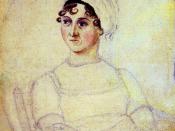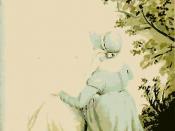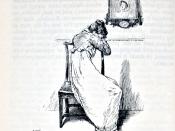Till this point in the novel, the reader has seen Emma take a strange and sudden likeness towards Harriet Smith. There are many possible suggestions for her motives for doing so. Also to be taken into account is the great difference in opinion between Emma and Mr. Knightley regarding the proposal sent for Harriet by Mr. Martin. Many aspects of the main character are unveiled by the author in showing her desire and need to control other people's lives.
After being alone at home for a while, with simply her father and the occasional guest for company, Emma understandably begins to feel bored and lonely, continuously suffering withdrawal symptoms for her beloved Miss Taylor. The author shows that she does not feel content staying at home in the evenings with her father and his friends, believing that "it was no remedy for the absence of Mrs. Weston." The reader sees that she is becoming depressed.
When she is introduced to Harriet, the reader wonders if she may be planning on filling the void that was Mrs. Weston with her. This would cure her depression, and give her a new 'project' to work on. Harriet would become someone whom Emma desires to control, and she "would form her opinions and her manners."
Soon enough, Harriet's regular visits at Hartfield became "a settled thing". By using this phrase, the author makes it seems as if Emma has decided this, and that Harriet promptly arrives at her every whim. Emma's true desire to become close with her remains unclear; however, Austen mentions that "Emma had foreseen how useful she might find her". The key word here is "useful", which has connotations that Emma is simply using Harriet to fill a void in her life, and is not friends with her because she...


